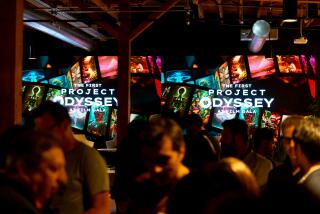Captions Give Films a New Sound : Hearing-impaired viewers will get to ‘see’ how ‘Jurassic Park’ sounds. Six captioned screenings are set in Glendale this week.
- Share via
“Come see the dinosaurs roar!” says the flyer advertising two special showings of Steven Spielberg’s blockbuster hit “Jurassic Park.”
If you are deaf or hearing impaired, that’s exactly how you would experience the sounds dinosaurs make. You would see the sounds in captions.
“ROOOOAAAAARRRR!!!!” Or when the dinos are peacefully grazing: “OOOO-oooo-UUU . . .”
Thursday and Saturday are the scheduled dates for six captioned showings of “Jurassic Park” at Regency One Theatre in Glendale, a project sponsored by Tripod Captioned Films with the support of Universal Studios, Amblin Entertainment and the Pacific Theatres chain.
Tripod is an educational organization for deaf children operating in partnership with Burbank Unified School District.
The project of showing captioned movies began as an occasional fund-raising event, but has since grown to the point where the screenings are attracting people from all over Southern California.
Ever since Pacific Theatres made an auditorium available, the group has been making plans for monthly showings, said Tripod President Megan Williams.
While “Jurassic Park” may be the latest captioned film, it marks the first time Tripod has been able to show a captioned movie while the film is still playing in first-run theaters. The group recently has shown such films as “Aladdin,” “The Bodyguard” and “Groundhog Day,” but they were seen months after their initial releases.
“It’s really critical for children to have the same access to current films the way their peers do,” said Williams.
“Most deaf or hard-of-hearing people have abandoned the movie theaters,” said Tripod board member Barbara Montan, who has been working with major studios to make prints of current films available for captioning. “Once (studios) realize there is an untapped market of about 18 million deaf or hard-of-hearing people, there may come a day when they release films automatically with captions.”
*
Montan said no studio has turned down a request for the print of a movie. “The program has started slowly because we’re new and the captioning is expensive for the studios,” she said.
It also helps that Tripod has influential friends in the film community who have made well-known movies. According to Williams, director Harold Ramis made “Ghostbusters” available, Cindy and Kevin Costner brought in “Dances With Wolves” and Montan’s husband, Chris, a senior vice president at Walt Disney Studios, secured “Aladdin.”
The captioning work for Tripod is created by Cinetyp Inc. in Hollywood, a firm that regularly provides subtitling for foreign-language films. President John Bell explained that the difference in subtitling a film from another language and captioning a film for hearing-impaired people is immense. “A foreign subtitle is the changing of the dialogue. You put the meaning across but not the words. A subtitle appears at the center of the screen.
“But imagine if you turned off the sound and people who are talking on the screen are not always visible. The hearing-impaired have to have a hint as to who is talking on the screen. So we put the caption under the image.”
In the case of “Jurassic Park,” Cinetyp’s David Margolis said he tried to let the visuals tell the story. “I try not to be intrusive. Our philosophy is to make people forget they are reading. For instance, I’m not putting in the word Boom when you hear the dinosaur footsteps. The word Boom could be misleading. And if I were to put in the explanation that actually says ‘dinosaur footsteps,’ that’s getting intrusive. So I just let the shaking glasses of water tell the story.”
More to Read
Only good movies
Get the Indie Focus newsletter, Mark Olsen's weekly guide to the world of cinema.
You may occasionally receive promotional content from the Los Angeles Times.










